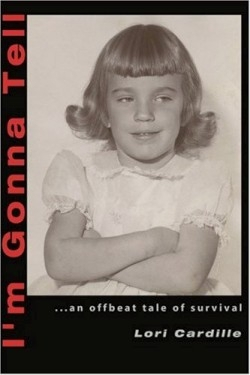I'm Gonna Tell
An Offbeat Tale of Survival
“Now who would like to become a priest or a nun when you grow up?” the priest asked a second grade class at St John’s Elementary School in 1962. All the children raised their hands or “flippers” as the author wryly calls them. “We were being shown off” she writes “like trained seals.” Rather than a mere nun however Lori Cardille wanted to become a saint in sharp contrast to what subsequently happened. In I’m Gonna Tell the author reveals what it was like to be a “sexual rag doll” to her Uncle Bob a medical doctor.
Not only was monster Bob lurking Cardille also had to be leery of her mother’s demons: alcoholism and depression. The “anxiety ridden” author describes the days after school when she would enter the house not knowing what parental phantasmagoria would be present. While her mother was at home her father was hosting a TV program in Pittsburgh called “Chiller Theatre” a show about ghosts and goblins.
During Cardille’s years at an all-girl Catholic high school she developed a penchant for acting. Later she attended Carnegie Mellon University’s prestigious drama school. Cardille found that on stage she could convincingly “tap” her rage and sadness.
After graduating she moved to New York and became Winter Austin on the soap opera The Edge of Night. In one episode the script called for her character to be raped by one of her ex-porno managers and then to kill him. “An atomic bomb of rage” exploded in Cardille; she was “emotionally hemorrhaging.” This breakdown lead to a stint in New York’s Paine Whitney hospital; psychoanalysis followed for years afterward. During this time she was on Ryan’s Hope acted on Broadway starred in Day of the Dead and won two acting awards.
Other atrocities were eventually learned about Dr. Bob; he allegedly exchanged drugs for sex with teenagers ravaged his wife and bludgeoned his son. Finally Cardille went to the authorities telling her family “because of what he did to me to you to others.”
The author’s story isn’t revealed in tedious chronological form; instead haunting flashbacks are used but sometimes with choppiness. Instead of dwelling on salacious details she uses discretion with the Dr. Bob incidents. The book could have been improved by using less hyperbole but her phraseology (“tsunami of memory”; “my ghosts of Erie past”) is imaginative. Significant dates would have helped as reference points.
The actress divulges her antidotes to her anxieties and offers encouragement to others: “We must learn to embrace our fears ourselves our memories our pain. The more we gain the courage to be truthful and tell even only to ourselves the more we can begin to be free.”
Disclosure: This article is not an endorsement, but a review. The publisher of this book provided free copies of the book and paid a small fee to have their book reviewed by a professional reviewer. Foreword Reviews and Clarion Reviews make no guarantee that the publisher will receive a positive review. Foreword Magazine, Inc. is disclosing this in accordance with the Federal Trade Commission’s 16 CFR, Part 255.

